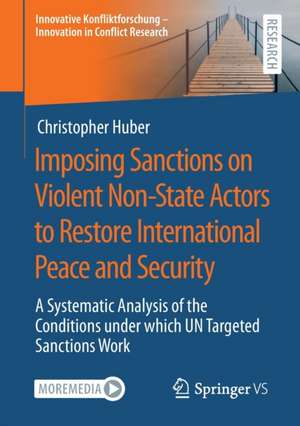Imposing Sanctions on Violent Non-State Actors to Restore International Peace and Security: A Systematic Analysis of the Conditions under which UN Targeted Sanctions Work: Innovative Konfliktforschung – Innovation in Conflict Research
Autor Christopher Huberen Limba Engleză Paperback – 7 iun 2022
Preț: 578.24 lei
Preț vechi: 680.27 lei
-15% Nou
Puncte Express: 867
Preț estimativ în valută:
110.66€ • 120.16$ • 92.95£
110.66€ • 120.16$ • 92.95£
Carte tipărită la comandă
Livrare economică 22 aprilie-06 mai
Preluare comenzi: 021 569.72.76
Specificații
ISBN-13: 9783658377434
ISBN-10: 3658377437
Pagini: 175
Ilustrații: XIII, 175 p. 25 illus.
Dimensiuni: 148 x 210 x 14 mm
Greutate: 0.26 kg
Ediția:1st ed. 2022
Editura: Springer Fachmedien Wiesbaden
Colecția Springer VS
Seria Innovative Konfliktforschung – Innovation in Conflict Research
Locul publicării:Wiesbaden, Germany
ISBN-10: 3658377437
Pagini: 175
Ilustrații: XIII, 175 p. 25 illus.
Dimensiuni: 148 x 210 x 14 mm
Greutate: 0.26 kg
Ediția:1st ed. 2022
Editura: Springer Fachmedien Wiesbaden
Colecția Springer VS
Seria Innovative Konfliktforschung – Innovation in Conflict Research
Locul publicării:Wiesbaden, Germany
Cuprins
Introduction.- International sanctions as a policy instrument to address challenges to international peace and security.- The United Nations as a sanctioning organization.- Conceptual and methodological challenges in the study of sanctions effectiveness.- Theorizing the effective sanctioning of violent non-state actors.- Empirical strategy.- Quantitative Analysis I.- Qualitative analysis.- Quantitative Analysis I.- Conclusion
Notă biografică
Christopher Huber is a Research Fellow associated with the GIGA German Institute for Global and Area Studies in Hamburg. His research focuses on international sanctions, counterterrorism and religious conflicts.
Textul de pe ultima copertă
In the last decades, violent non-state actors (VNSAs) such as rebel and terrorist organizations have proved their capacity to break international law. The international community, particularly the United Nations (UN), has reacted to this development by redirecting its conflict resolution efforts to these non-state entities. This has turned targeted sanctions into one of the most vital and indispensable foreign policy tools available to the UN Security Council in combating terrorism and contributing to the peaceful resolution of (intra-state) conflicts. Despite the UN Security Council’s growing tendency to sanction VNSAs, there has been little research analyzing the effects of UN targeted sanctions on these non-government actors. This book seeks to fill this gap and shifts the focus on non-state actors by ascertaining the general mechanisms through and conditions under which UN targeted sanctions imposed on VNSAs tend to be effective. The tripartite empirical analysis combining quantitative and qualitative research methods demonstrates that the state-centric understanding of how sanctions work is not simply applicable to the effective sanctioning of violent non-state actors such as rebel and terrorist movements.
About the author
Christopher Huber is a Research Fellow associated with the GIGA German Institute for Global and Area Studies in Hamburg. His research focuses on international sanctions, counterterrorism and religious conflicts.
Christopher Huber is a Research Fellow associated with the GIGA German Institute for Global and Area Studies in Hamburg. His research focuses on international sanctions, counterterrorism and religious conflicts.



